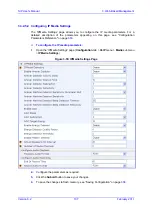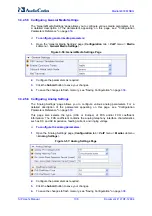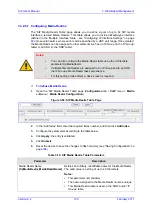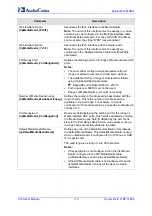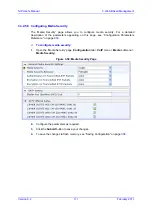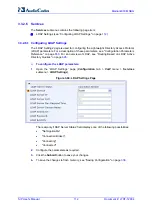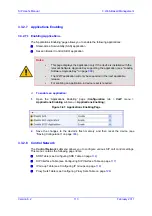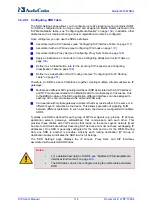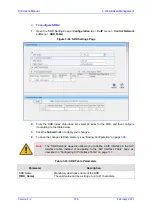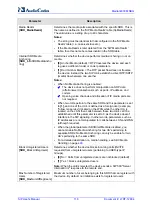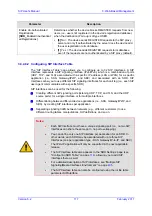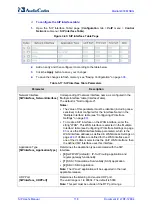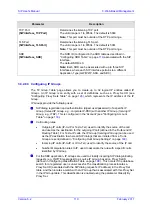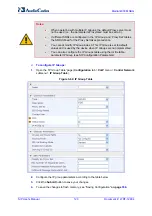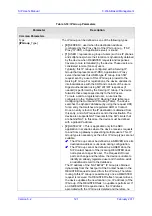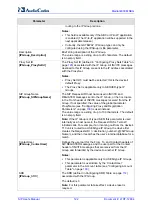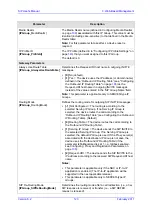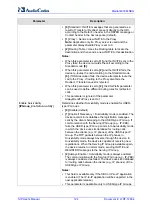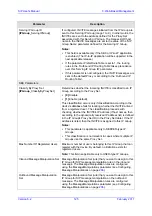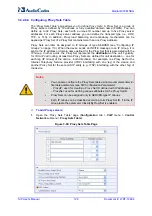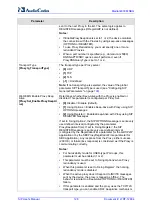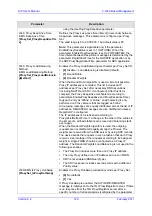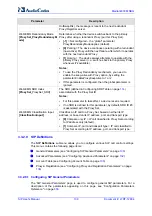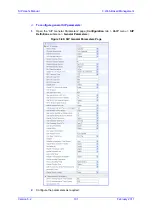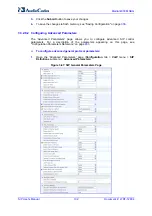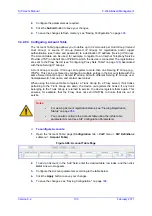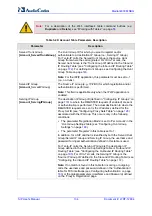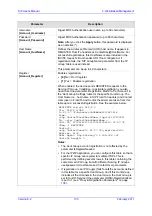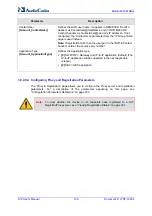
Version 6.2
121
February 2011
SIP User's Manual
3. Web-Based Management
Table
3-18: IP Group Parameters
Parameter
Description
Common Parameters
Type
[IPGroup_
Type]
The IP Group can be defined as one of the following types:
[0]
SERVER = used when the destination address
(configured by the Proxy Set) of the IP Group (e.g., ITSP,
Proxy, IP-PBX, or Application server) is known.
[1]
USER = represents a group of users (such as IP phones
and softphones) where their location is dynamically obtained
by the device when REGISTER requests and responses
traverse (or are terminated) by the device. These users are
considered remote (far-end) users.
Typically, this IP Group is configured with a Serving IP
Group that represents an IP-PBX, Application or Proxy
server that serves this USER-type IP Group. Each SIP
request sent by a user of this IP Group is proxied to the
Serving IP Group. For registrations, the device updates its
internal database with the AOR and contacts of the users.
Digest authentication using SIP 401/407 responses (if
needed) is performed by the Serving IP Group. The device
forwards these responses directly to the SIP users.
To route a call to a registered user, a rule must be
configured in the ‘Outbound IP Routing Table’ table (see
Configuring the Outbound IP Routing Table). The device
searches the dynamic database (by using the request URI)
for an entry that matches a registered AOR or Contact.
Once an entry is found, the IP destination is obtained from
this entry, and a SIP request is sent to the destination.The
device also supports NAT traversal for the SIP clients that
are behind NAT. In this case, the device must be defined
with a global IP address.
[2]
GATEWAY = This is applicable only to the SBC
application in scenarios where the device receives requests
to and from a gateway representing multiple users. This IP
Group type is necessary as the other IP Group types are not
suitable:
9
The IP Group cannot be defined as a SERVER since its
destination address is unknown during configuration.
9
The IP Group cannot be defined as a USER since the
SIP Contact header of the incoming REGISTER does
not represent a specific user. The Request-URI user
part can change and therefore, the device is unable to
identify an already registered user and therefore, adds
an additional record to the database.
The IP address of the “GATEWAY” IP Group is obtained
dynamically from the host part of the Contact header in the
REGISTER request received from the IP Group. Therefore,
routing to this IP Group is possible only once a REGISTER
request is received. If a REGISTER refresh request arrives,
the device updates the new location (i.e., IP address) of the
IP Group. If the REGISTER fails, no update is performed. If
an UN-REGISTER request arrives, the IP address
associated with the IP Group is deleted and therefore, no
Summary of Contents for Mediant 800 MSBG
Page 2: ......
Page 366: ...SIP User s Manual 366 Document LTRT 12804 Mediant 800 MSBG Reader s Notes ...
Page 372: ...SIP User s Manual 372 Document LTRT 12804 Mediant 800 MSBG Reader s Notes ...
Page 390: ...SIP User s Manual 390 Document LTRT 12804 Mediant 800 MSBG Reader s Notes ...
Page 404: ...SIP User s Manual 404 Document LTRT 12804 Mediant 800 MSBG Reader s Notes ...
Page 616: ...SIP User s Manual 616 Document LTRT 12804 Mediant 800 MSBG Reader s Notes ...
Page 636: ...SIP User s Manual 636 Document LTRT 12804 Mediant 800 MSBG Reader s Notes ...
Page 652: ...SIP User s Manual 652 Document LTRT 12804 Mediant 800 MSBG Reader s Notes ...
Page 886: ...SIP User s Manual 886 Document LTRT 12804 Mediant 800 MSBG Reader s Notes ...

